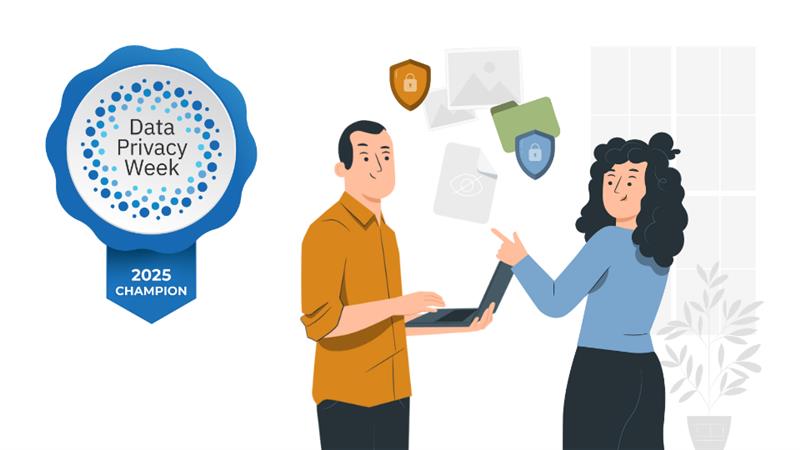The 2025 Data Privacy Week awareness campaign aims to educate and empower individuals to take control of their personal data.
BUI is proud to announce its commitment to the 2025 Data Privacy Week campaign. As a Data Privacy Week Champion, BUI recognises and supports the principle that all organisations share the responsibility of being conscientious stewards of personal information.
Data Privacy Week is an annual awareness initiative that takes place from 27-31 January. The goal is twofold: to help individuals understand that they have the power to manage their data and to help organisations appreciate why it’s necessary to respect the user data they collect, process, and store.
This year’s theme is Take control of your data – and it’s a timely reminder for everyone as the world becomes more digitally connected, notes BUI Group Governance and Compliance Manager Dhiren Boodhia. “Data Privacy Week highlights the fact that trust is built on transparency. Individuals want to know that their personal information is respected and protected by those who have access to it,” says Boodhia. “As privacy laws and public expectations continue to evolve, organisations should strive to go beyond mere compliance to create a culture of accountability around data privacy and security.”
How vigilant are you about your data privacy?
Your digital activities generate huge amounts of data: websites, apps and online services collect information about your behaviours, your interests, and your purchases. Often, this includes personal data like your identity number and home address. It can even include data about your physical self: think about how smart devices can save health and fitness records as you exercise.
While you cannot control how each byte of data about yourself and your family is shared and processed, you are not helpless! In many cases, you can control how you share your data with a few simple steps. Remember, your personal data is precious and you deserve to be selective about who you share it with. Here are three simple steps to help you manage your data privacy, according to guidelines from the National Cybersecurity Alliance:
1. Know the trade-off between privacy and convenience
Nowadays, when you download a new app, create a new online account, or join a new social media platform, you’ll often be asked for access to your personal information before you can even use it! This data might include your geographic location, contacts, and photos.
For these businesses, personal information about you is tremendously valuable – and you should think about whether the service you get in return is worth the data you must hand over, even if the service is free. Make informed decisions about sharing your data with businesses or third-party service providers… Ask yourself:
- Is the service, app, or game worth the amount or type of personal data wanted in return?
- Is the data requested even relevant for the service, app, or game?
- Can you control your data privacy and still use the service, app, or game?
- If you haven’t used the service, app, or game in several months, is it worth keeping around knowing that it might be collecting and sharing your data?
2. Adjust privacy settings to your comfort level
For every app, account, or device, check the privacy and security settings. These should be easy to find in the relevant Settings section and should take a few moments to change. Set them to your comfort level for personal information sharing. In general, it’s wise to share less data, not more.
You don’t have to do this for every account at once: start small and over time you’ll make a habit of adjusting all your settings to your comfort level. The National Cybersecurity Alliance has several free resources, including the Manage Your Privacy Settings page, to help you find and check the settings of social media accounts, apps, and more.
3. Protect your data
Data privacy and data security go hand-in-hand. Along with managing your data privacy settings, remember these four tips to safeguard your information:
- Create long, strong, unique passwords for each account and device, and consider using a password manager to store each password securely.
- Turn on multi-factor authentication wherever it is permitted. This helps keep your data safe even if your password is compromised.
- Turn on automatic device, software and browser updates, or make sure you install updates as soon as they are available.
- Learn how to identify phishing messages, which can be sent as emails, texts, or direct messages.
During Data Privacy Week this January, we’ll be sharing useful tips and resources to help you become more aware about data privacy at work, at home, and on the move. Follow us on Facebook and LinkedIn so you never miss a post, and join the conversation by using the #DataPrivacyWeek hashtag online.
About Data Privacy Week
Data Privacy Week began as Data Privacy Day in the United States and Canada in January 2008 as an extension of the Data Protection Day celebration in Europe. Data Protection Day commemorates the 28 January 1981 signing of Convention 108, the first legally binding international treaty dealing with privacy and data protection. The National Cybersecurity Alliance, the United States’ leading non-profit, public-private partnership promoting cybersecurity and privacy education and awareness, leads the effort in North America each year. For more information, visit www.staysafeonline.org/data-privacy-week/.
About the National Cybersecurity Alliance
The National Cybersecurity Alliance (NCA) is a non-profit organisation on a mission to create a more secure, interconnected world. The NCA advocates for the safe use of all technology and educates everyone on how best to protect themselves, their families, and their organisations from cybercrime. The NCA creates strong partnerships between governments and corporations to amplify its message and to foster a greater digital good. For more information, visit www.staysafeonline.org.
